www.chechurubiera.info - an online magazine for fans of Chechu Rubiera
WE SUPPORT BRAVEHEART
OFFICIAL CHARITY 2008/09
 The Braveheart Fund was launched in 2003 by former British champion, Motorola professional and Giro díItalia survivor Brian Smith.
The Braveheart Fund was launched in 2003 by former British champion, Motorola professional and Giro díItalia survivor Brian Smith.
Its aim is simple: to raise the funds to allow young Scottish cyclists, be they roadies, trackies or mountain bikers, to fulfil their potential.
Braveheart is about the cycling community coming together to help young riders pursue their goals and ambitions.
Braveheart is our official charity for 2008. As Chechu retires this year, it is appropriate to support tomorrow's pro-cyclists.
Go to Braveheart Cycling Fund
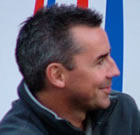
INTERVIEW
BRIAN SMITH
The Braveheart Cycling Fund is five years old now. It has supported over 50 young, ambitious Scottish cyclists, and raised over £100,000.
For you, what has the fund achieved so far, and what brings you the greatest satisfaction?
The Fund has achieved worldwide recognition in the cycling world and allowed us to help many young Scots towards their goals. We have brought the Scottish cycling community together and organised one of the best nights in British cycling with our annual dinner.
The passion and pride the Fund provides has proved to be a catalyst in helping these youngsters believe in themselves.
The best part of the Fund is the opening of the door to opportunities that motivate the young cyclists in Scotland to aim at. The greatest satisfaction for me is helping to make a difference in a youngsters cycling career. Whether itís to become a World Champion or the opportunity to race in Europe.
Apart from better weather, what do young cyclists in Scotland need to compete at the top level?
More dedication than the others they are racing against. I wasnít the most talented when I was a youth in Scotland but had more dedication than most.
Looking at the bigger picture kept my interest in cycling and the willingness to learn. Stickativity is the key to success.
Scotland has a world-beating palmares on the track, and it would be a dream to have road cyclists of the calibre of Hoy and McLean. Who gets you excited about Scotland's future on the road, men and women?
Ross Creber, Hamish Creber and Eileen Roe have the potential to progress to a good level in world cycling. It all depends on how much they want it.
The Creber brothers have chosen the MTB career path but it never did Cadel Evans any harm.
Eileen is very keen and has joined the Swift Racing Team to further her road/cyclocross career. I believe she has the perfect opportunities now to progress with the help of this team.
There is also my son Ethan but he is only 10 weeks old!†
In a recent feature, it was stated that the core of the fund's ethos is the idea of desire. You don't always support the most talented rider, but the one who has ďinner driveĒ. Is that true, and how do you assess inner drive?
The core of the Fund is to experience racing in Europe. Not everyone wishes to ride abroad. This is essential to become a pro.
We look at every individual but will always appreciate those individuals that are willing to race and train in Europe. It's okay being a big fish in a small pond but the fund is looking for the smaller fish that are showing the determination to learn and progress into the bigger fish.
Itís more long term than backing the best talent. From my experience the best talented riders tend not to go the distance.
You have another Fundraising Ride and Annual Dinner planned for October. Many pro-cycling stars have taken part over the years, both events are highlights of the Scottish cycling calendar. So what's next? What can we all get involved in?
We have an annual fundraising dinner and ride in October. We are open to any fundraising opportunities that are presented before us.
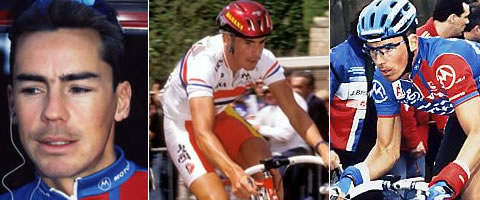 In the 1990s, you were a top professional, riding in the European peloton and a couple of years in America. For you, how was cycling in the US different to cycling in Europe, and do you think it has changed since Armstrong?
In the 1990s, you were a top professional, riding in the European peloton and a couple of years in America. For you, how was cycling in the US different to cycling in Europe, and do you think it has changed since Armstrong?
It has definitely changed since Lance. Racing in the US was so behind the times, it was embarrassing. Lance helped bring cycling into the lives of so many Americans that cycling has become a widely recognised sport.
Now the racing and events in the US are second to none. I think thatís a result of education and a very hardworking infrastructure.
In 1994, you rode Chechu's favourite race, the Giro d'Italia with Motorola, supporting Andy Hampsten. What are your memories of this race?
22 days with no rest day!
The brutal mountains and the huge change in weather as the race passed through the whole of Italy. 37C in the south to snow at Sestriere.
Apart from all this it was one of the best experiences of my life. Great race, great crowds and great food!
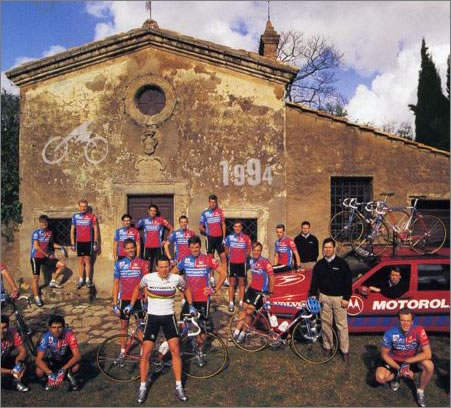 You're probably best known to most visitors to ChechuRubiera.info for your dry wit and commentary on cycling.tv. During the broadcast, you call the action, answer questions from the Innertube, and there's always news, other results and interviews. How do you prepare for each race?
You're probably best known to most visitors to ChechuRubiera.info for your dry wit and commentary on cycling.tv. During the broadcast, you call the action, answer questions from the Innertube, and there's always news, other results and interviews. How do you prepare for each race?
I spend a lot of time on the web and use my contacts to keep me up to date with whatís happening in the world of cycling. I am and always will be a fan of cycling.
I read multiple websites and whatever material comes my way. I would say that I do anywhere between 2 and 4 hours of research on a daily basis.
You never know what you are going to be asked during a live commentary and I have never failed to give some sort of answer to this day.
Johan Bruyneel has said that this year's Tour de France is the loser by not letting Alberto Contador defend his title. Do you think that's true?
Yes. They are not the same team as the last 2 years. You cannot penalise a sponsor as they are only putting money into our sport. I now think the Giro has risen in stature by including Astana in its roster. I do still hope to see Astana in the Tour this year.
We know you're a fan of Cadel Evans, is it his year for the Tour?
I do not know Cadel too well but I am a fan of his determination. I think it will still be difficult for him to win. Who will he follow? How will his team deal with leading the race? Will the whole team be dedicated to Evans? What about Robbie? Too many questions to be answered on this one but I wish him the best.
You've talked of your retirement and the huge weight being lifted from your shoulders. Despite his great form this season, Chechu has decided to finish. Any advice for him?
I walked away from cycling for 4 years to do all the things I could not do as a cyclist. I returned with great enthusiasm and have never looked back.
My advice would be to carry on as long as you are physically capable of.
When you retire, it is very hard if you do not have another commitment. My advice would be to feed the habit of the adrenalin rush you get from cycling by something else you enjoy.
As a pundit and a cycling fan, how would you describe Chechu Rubiera?
Choo Choo as a young person describes a trainís noise.
Chechu was the engine of any team he rode for. Underestimated to the untrained eye but celebrated by the people who understand that without a team you have nothing.†Behind every champion is a team of champions.
And in one word (just for fun),
Relaxing at home Ė music or TV? TV
The best place in the world Home
The best movie ever Shawshank Redemption
The book on your bedside table tonight The Eagle of the Canavase
A night out Ė movie, dinner or nightclub? Dinner
The person you admire most My father
Nappies Ė reuse or dispose? Dispose
Go to Brian Smith Cycling
INTERVIEW
DAVID SMITH
Through Chechu, we've had a glimpse of the life of a professional cyclist.
Now we're curious about life for young riders, amateurs riding the same roads as the pro teams, learning the trade. Their goal is that elusive win which might just get them noticed. The racing is tough, with disappointments and dashed hopes on the road.
Braveheart Cycling Fund supports David Smith, 22 years old, from Caithness in north Scotland. He's been riding in France for nearly three years with his team, Velo Club Lyon Vaulx-en-Velin.
You can read David's regular diaries from Lyon. Last week, we spoke to him to find out more.
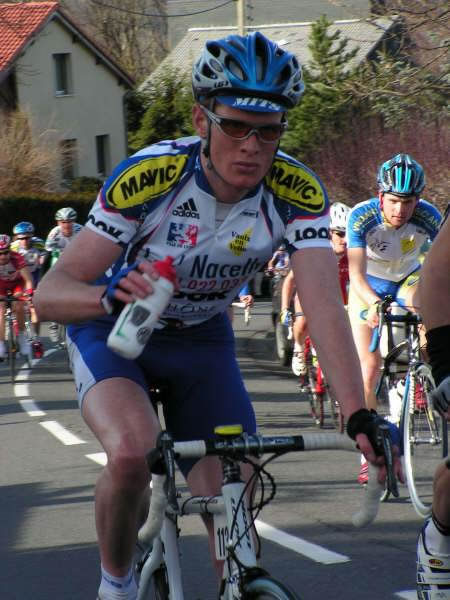
When did you first race in Europe. How did you a place on Velo Club Lyon Vaulx-en-Velin?
I actually first raced in Europe as a second year junior, more really through a lucky coincidence than anything else. My mum knew that her best friend from school had a brother (called Philip Smith, no relation though!) who ran cycling holidays in the DrŰme region of France (Gastrobiking) and asked her for his phone number.
I called him up to ask if he knew of any teams in the area and how I might go about riding for them and it turned out, he knew a guy who ran a bike shop in Romans who was quite involved in the local club, VS Romans.
Through him, he got in touch with the guy who looked after their junior team and he was pretty interested in taking me on when he saw Iíd finished 7th at Junior Nationals the year before.
In the end, Phil said there was no problem if I wanted to stay with him and race with the team so I went out at the start of May and raced there for 2 months. It was a fantastic experience and Iím still really grateful to Phil for helping me get that first foot in the door!
As for Vaulx-en-Velin, at the end of 2005 season (based mostly in Britain) which, for various reasons, I hadnít really enjoyed, I decided to go back to France and so I just got the addresses of all the big French clubs off the internet and sent out my CV. I had a few offers one of which was Vaulx and after discussing a little with Michel Gros, the manager decided it would be my best option.
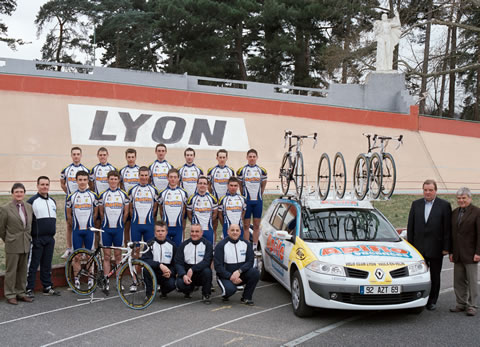
You've been there for two years now, where are you based? How long do you spend in France each year? Is language a problem?
I live in a studio apartment rented by the club on the east side of Lyon in a suburb called Meyzieu. Itís about 8km from Saint-Exupťry airport and I can more or less get straight into the countryside from there which is good for training.
Every year so far, Iíve always gone to France at end of January. Usually I have a couple of weeks to re-adjust then before the first races and team training camp. Afterwards, I usually come back to the UK for a couple of weeks around the end of June for a break and then go back until the season finishes in mid-October.
The language after being here for 2 and a half years is no longer a problem at all. This year is the first time there has even been another English speaker in the team (Adam Illingworth) so I was really motivated to learn French properly to get to know my team-mates and be able to have a good laugh. Itís no fun if you canít understand anything they are saying or any of the jokes.
I think thatís usually why so many English speakers give up and come home, not so much because the level of racing is beyond them, but more because they are unable to really integrate and feel lonely or left out which is understandable. I was determined not to let this happen to me.
You're aiming for a professional contract. How important has the support from Braveheart Cycling Fund been for you?
I really canít overstate how important support from the Braveheart Fund has been, financially it would have been more or less impossible for me to stay out here otherwise.
Prize money in the amateurs here is (according to the older generation) nothing compared with what it once was fifteen or twenty years ago. Unfortunately so many of the summer criteriums no longer exist and with the sprint primes they offered, this was always a good way to earn extra money. There are maybe only a handful of elite criteriums every year now, itís a real shame.
How can supporters of cycling, including the fans who will read this, help you to be a professional cyclist? What do you need?
Most of how successful you is down to yourself, your natural ability, how much hard work you put in plus a bit of luck.
I guess anyone who goes to the Braveheart dinner or supports the fund in any other way is helping me out.
Itís also just good to know that people read the diaries on the fundís website, just to know people care about what youíre up to is sometimes a really good moral boost. At the end of the day though, itís up to me to do the pedaling!
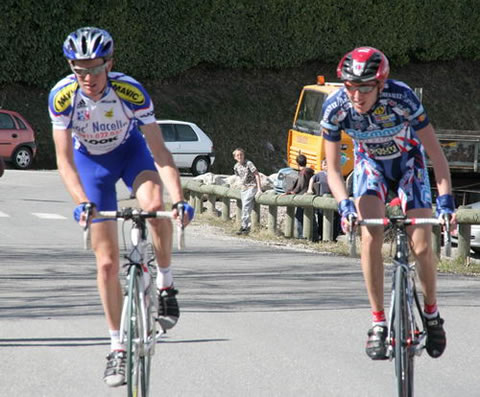
What's your role in the team?
Nobody has any real set role in the team that they stick to year round. It largely depends on whoís going well at any given period.
Everyone has their chance if the legs are good. For example, in a stage race if there is someone up there in contention for GC on the first stage then everybody else will try and help them out in the following stages, chasing down dangerous breaks, going with the early moves etc.
This year especially, there is a really good bunch of guys in the team and no-one has any gripes about helping someone else out if needed. Thereís no jealously which is always a terrible thing to have in a team.
What's your favourite local training route, and why?
The traffic in the Lyon area can be pretty heavy as itís a major city. I always have 20km or so to ride in any direction where you have to be careful of nutcase lorry drivers and the like, riding in a group can often be seriously risky. Iíve had some really close calls when riding with team-mates.
The roads I train on often are those out the back of Cremieu in the IsŤre or Les Dombes in líAin if Iím looking to do a flatter ride. I sometimes head to Lagnieu and ride the Chartreuse des Portes which is a 17km climb, itís pretty cool.
My all time favorite area for training though is still the Vercors in the DrŰme where I stayed with Phil as a junior. The roads are so quiet, there are so many of them and so many climbs of all different lengths. Also the scenery is really spectacular, for anyone who has never been I can really recommend it.
What's the toughest mountain you've raced so far? Your best race, and why?
The toughest would be a toss-up between the Col du Glandon (St.Jean de Maurienne side) during the 2007 Tour de Savoie and Gressonay-la-Trinitť in Italyís Val díAoste during the 2007 Giro díAoste.
The Glandon is 21km long but it was made so hard because Iíd been in the break from the off that day over the Col du Mollard (itself 12km long) and it came after 100km of racing.
We got caught just at the bottom and I was really in the hurt box and the race completely exploded within 2km of starting the climb. In the end, I think the winner Dan Martin put nearly 15minutes into the 10th placed rider to give you some idea of the damage it did.
In my opinion it was a bit hard for an espoir race but still a fantastic experience, itís not often you get to race Cols usually reserved for races like the Tour or the Dauphinť.
Gressonay wasnít as steep as the Glandon, it was however 30km long. It just went on forever, it maybe wasnít so tough in terms of percentage but the length was unbelievable, I also felt terrible and afterwards was laid out with food poisoning for 3 days. Having that lurking round in my system during the race probably didnít help my cause!
My favourite race is probably Annemasse-Bellegard. There are always 160-200 riders at the start, the course is awesome with a succession of 4-5km climbs in the last 50km and the backdrop of the Alps is amazing. The race is at the end of March and there is always still a lot of snow on the peaks, itís beautiful.
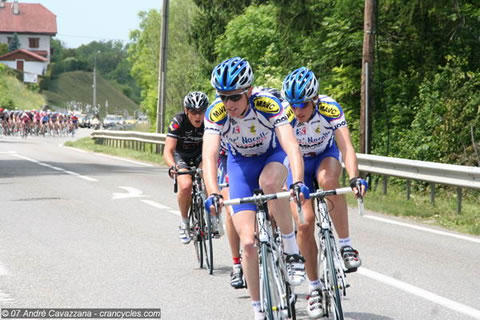
How do you get the professional teams to notice you? And have you had any approaches from them yet?
To get the pro teams to take notice you just have to get big results, regularly. And win a few major races. It also then helps to have good contacts.
Another good way is to go well in UCI 1.2ís and 2.2ís when there are teams like Agritubel at the start. If you have a good race they will remember your name. Unfortunately for the moment I havenít had any approaches myself, Iím still looking for that elusive big win!
Can you remember your first bike, what was it? And your first race? Did you win?
My first road bike was a second hand Peugeot my parents bought me for Christmas when I was about 11 or 12 years old. It had the same paint job as the Peugeot team bike Robert Millar rode in the 80s. After that, I was always saving up money to buy new parts for it, I loved that bike!
My first race was probably a Caithness Cycling Club 10 mile time trial, I definitely didnít win. I guess my first road race (actually it was a circuit race) was the U14 national champs in Milton Keynes. I think I finished 5th. After that, I did Manchester Youth Tour the same year and won a stage but didnít really bother much with racing again until I was junior.
Do you think Britain will have an elite ProTour team by 2010, it's been talked about in the media?
Well, I think the ProTour is dead for sure but there is a real possibility Britain will have a good pro team in the near future.
Cycling seems to be suddenly getting a good deal more media exposure in the UK and this will certainly attract interest from corporate business.
I think it is more likely British Cycling would start out with a second tier team though and move up to the top level after a couple of seasons. Jumping straight in the deep end from the off, no matter how experienced the riders and staff are as individuals is rarely a good idea. The high pressure environment can create a lot friction between people if they donít know each other very well.
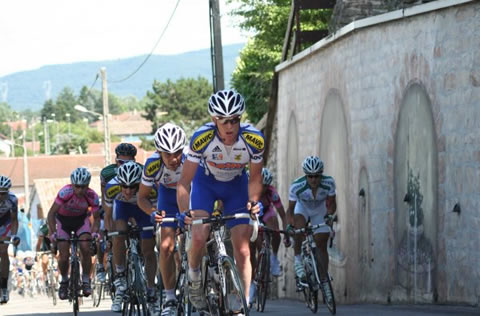
Who is your cycling hero?
I suppose the right answer to this is Chechu! I donít really have a hero but I really admire Thor Hushovd, that guy is so strong and can do everything aside from the high mountains. Also there was a guy at Vaulx a few years ago, Ludovic Martin who had previously ridden for Credit Agricole and he always said Hushovd was the coolest guy on the team!
Scottish cycling has a fantastic record on the track, are there indications that we replicate this on the road?
Itís difficult to say. I think the problem in Scotland, as with the rest of the UK, is kids in general just donít realise they can ride a bike for a living. Although cycling is starting to get more media coverage itís still nothing like on the scale of football, for example.
The other problem is the safety issue in road racing. The government constantly bleats on about how important it is to lead a healthy, active lifestyle yet the police, which is government-funded are unable to provide affordable support to race organisers and to the riders who ironically are participating in a sport which keeps you fit and healthy like no other!
Itís a contradiction which definitely needs addressing.
Here in France, you never do a race without a full escort of Gendarmes, that certainly calms the more impatient drivers down a little!
Whilst there is the possibility of their kid being mown down by some moron in a 3 series off to fetch the Sunday paper who canít be bothered to stop for 5 minutes, you can understand why the majority of parents would be reluctant to let them participate.
Once there are the numbers of kids coming through, it is only a matter of time before one of them turns out to be world class Ö take the example of a country like Estonia, it has a far smaller population than Scotland but currently four guys riding for ProTour teams and lots more riders knocking at the door.
The structures that Scottish Cycling are currently putting into place will hopefully begin to resolve this.
Reforming the road race series to the new Super Six Series I think has also been step in the right direction, the courses are far more spectator-friendly from what I am told.
Also Pedal Power RT are trying to put together a good, long-term strategy to register as a Continental team and compete in some higher level races. This would be great because it would give junior riders something to really aim for that is both attainable and a good stepping stone between amateurs in the UK and a career on the continent.

As you ride towards a professional career, our friend Chechu Rubiera is about to retire. If you were to talk to him now, what would you ask him?
Any chance of replacing you at Astana? Nah, just kidding, all cyclists whether amateur or pro usually have some great anecdotes to tell, Iíd probably ask him what his best ones were from his career, Iím sure he has some great ones to tell!
You can support David Smith. Go to BRAVEHEART CYCLING FUND